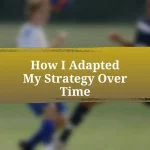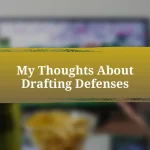Key takeaways:
- Expert insights enhance decision-making in fantasy football by providing data and uncovering trends that fans might overlook.
- Podcasts, social media, and established sports websites serve as valuable sources for real-time expert advice and community engagement.
- Personalizing expert recommendations according to individual team needs and league rules is crucial for effective strategy implementation.
- Tracking results and adjusting strategies mid-season can improve performance; emotional ties to players should be balanced with analytical assessments.
Author: Emma Hartley
Bio: Emma Hartley is an accomplished author known for her compelling narratives that explore the complexities of human relationships and societal themes. With a background in psychology and literature, her work often fuses emotional depth with sharp wit, captivating readers around the world. Emma’s novels have earned critical acclaim and numerous awards, solidifying her place in contemporary fiction. When she’s not writing, she enjoys hiking and volunteering with local literacy programs. Emma resides in Seattle with her two rescue dogs, and she is currently working on her next novel.
Importance of Expert Insights
When it comes to fantasy football, tapping into expert insights can be a game-changer. I still remember the first time I followed expert advice during a draft. The expert’s tips on sleeper picks helped me snag players who ended up outperforming their projections, and that thrill has guided my choices ever since. What a satisfying feeling it is to see a well-researched pick turn into a winning moment!
Expert insights not only provide solid data but also uncover trends that the average fan might overlook. Have you ever wondered why certain players thrive in specific matchups? I’ve found that when I rely on the analytical breakdowns from experts, my decision-making becomes sharper and more strategic. It’s like having a playbook that reveals hidden paths to victory.
Moreover, delving into expert opinions fosters a deeper connection to the game. When I hear an analyst’s passionate debate about a player’s potential, it ignites my enthusiasm and pushes me to research further. This emotional investment amplifies my experience, turning lineup decisions into engaging challenges rather than mundane tasks. Isn’t it exhilarating when expert insights can transform how we view and engage with fantasy football?
Sources of Expert Advice
When it comes to sourcing expert advice, I often turn to established sports websites and famous analysts. For instance, I recall scrolling through ESPN during a crucial week of the season. I stumbled upon an article that highlighted a player’s sudden surge in performance; it completely shifted my perspective and influenced critical roster changes. Have you ever felt that rush when a simple article guides a strategic pivot? That’s the power of expert knowledge.
Podcasts are another fantastic resource. I enjoy tuning into my favorite fantasy football podcast while driving to work. The banter and insights from seasoned players can spark new strategies that I might have never considered on my own. Listening to experts dissect the stats makes me feel connected to a broader community, fueling my competitive spirit. Have you ever found yourself rethinking your lineup after a heated discussion on a podcast? It’s amazing how fresh ideas can emerge from these conversations.
Social media platforms offer real-time insights that I find incredibly valuable as well. Engaging with analysts on Twitter, for example, allows me to catch breaking news, last-minute injury reports, or last-minute lineup changes. The immediacy of this information often gives me an edge. Isn’t it great to be part of a conversation where you can feel the excitement of constant updates? It keeps my fantasy football experience dynamic and responsive, ensuring I’m always in the know.
Evaluating Expert Recommendations
Evaluating expert recommendations is essential to making informed decisions in fantasy football. When I come across player advice, I often assess it against my own research and gut feelings. For example, I remember a week when an analyst passionately backed a seemingly average running back. I was skeptical but decided to trust my instinct. That choice resulted in a surprise game-winning performance. Have you ever second-guessed expert advice only to be pleasantly surprised?
I also find it helpful to compare different analysts’ opinions. Last season, I noticed that two well-respected experts had conflicting views on a quarterback’s viability. I spent some time delving into their reasoning. This process not only sharpened my analytical skills but also helped me understand the nuances of player performance. Have you taken the time to dissect differing expert opinions? It can lead to a deeper appreciation of the game and its complexities.
The timing of expert insights can significantly impact their value. There was a week when an injury report dropped just hours before a game. An analyst’s quick reaction to this news allowed me to pivot my lineup effectively. I was fortunate to catch their tweet in time, which emphasized the importance of staying alert to expert recommendations. How many times have you felt the thrill of a last-minute update changing your game? It’s moments like these that highlight the value of being engaged and proactive.
Incorporating Advice into Strategy
When incorporating expert advice into my fantasy football strategy, I always evaluate the context in which the recommendations are made. I recall a time when an expert championed a player on a mediocre team, pointing out their strong matchup. Initially, I hesitated, thinking, “Why trust a player on a struggling team?” But after considering the expert’s reasoning, I decided to take the plunge, and it paid off handsomely. Have you ever found confidence in an unexpected pick that turned out to be a game changer?
A crucial aspect of integrating expert advice is understanding the metrics behind the recommendations. I once came across a detailed analysis on how certain statistical trends correlate with player performance. This insight prompted me to review my roster and consider players I had previously overlooked. The resulting adjustments led to a significant boost in my weekly scoring. Have you taken the time to dive into the stats beyond the experts’ words? You might be surprised at what you discover and how it can reshape your lineup.
Consistency in applying expert recommendations can be tricky, especially when emotions run high during game weeks. Last season, after a dismal performance, I nearly benched a star player based solely on my frustration. A wise friend reminded me of expert advice emphasizing the need to look at long-term performance, not just one game. I held onto that player, and it turned out to be the right decision, as they bounced back in the following week. Have you ever let emotions cloud your judgment, only to miss out on a great opportunity? Embracing a balanced approach can keep your strategy firmly grounded.
Personalizing Expert Insights
When it comes to personalizing expert insights, I’ve found it’s all about aligning those recommendations with my unique team composition and league scoring system. I remember a time when I received a generic player suggestion that didn’t quite fit my roster needs. Rather than following it blindly, I considered how my top players were performing and adjusted the advice to target a different position that could elevate my team’s overall strength. Have you ever tailored an expert’s suggestion to fit your specific situation? It can lead to more effective decisions.
I often notice that expert forecasts, while informative, can sidestep how player dynamics interact with my league’s quirks. During last year’s draft, one analyst was all in on a particular running back, highlighting their potential; however, I had to take into account that I was in a PPR (Point Per Reception) league, where pass-catching backs often shine. That nuance allowed me to choose a different player who perfectly matched my team structure and scoring style, transforming my draft experience. How important is it for you to adapt advice to your league’s specific rules?
Emotional connections to certain players can sometimes skew my decision-making, but I strive to balance that with expert analysis. I recall a favorite player of mine, who, despite struggling in previous seasons, had my unwavering support. An expert breakdown suggested letting him go, but I didn’t want to part ways. Eventually, I sifted through their recommendations and decided to keep my favorite, which taught me the value of emotional investment when backed by solid reasoning. How do you manage those emotional ties while still making informed decisions? Personalizing expert insights means valuing both analytics and your passion for the game.
Tracking Results and Adjusting Strategy
Tracking my results is vital for refining my fantasy football strategy. After each week, I sit down to analyze my lineup’s performance and quantify my success. For instance, last season, I realized that my wide receivers were underperforming, and it prompted me to dig deeper into my players’ matchups and respective defensive opponents. Are you tracking your stats closely enough to reveal those patterns?
I’ve also learned that adjusting my strategy mid-season can be a game-changer. One year, I discovered that stacking players from the same team during favorable matchups could significantly boost my points. This revelation came after I observed how a quarterback and his top receiver consistently worked together to dominate. Have you ever considered stacking players to maximize your scoring potential?
Emotionally, tracking results is a mixed bag. There are times when I feel attached to certain players, which can cloud my judgment about switching them out for someone hotter on the waiver wire. For example, I held onto a struggling quarterback way too long simply because I believed he would rebound. That experience reminded me to focus on the data rather than my feelings. How do you balance emotional ties with the need for strategic changes?















